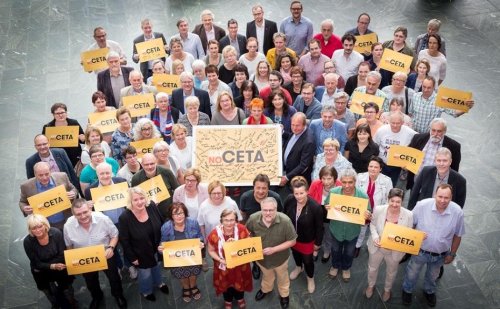EurActiv | 6 July 2016
Member states claw back control over CETA
By Cécile Barbière
National parliaments will have their say over the trade deal struck between the EU and Canada, the European Commission announced yesterday (5 July). This victory for Paris and Berlin greatly decreases the chance of the deal being ratified. EurActiv France reports.
The ratification process for the Comprehensive Economic and Trade Agreement (CETA) between the EU and Canada is set to be a bumpy one. The European executive announced on Tuesday that the EU’s 28 national parliaments would have to vote on the treaty before it can be definitively adopted.
This compromise is a response to mounting pressure from European countries, which demanded that their national parliaments be consulted before any deal be enacted.
“From a strict legal standpoint, the Commission considers this agreement to fall under exclusive EU competence. However, the political situation in the Council is clear, and we understand the need for proposing it as a ‘mixed’ agreement, in order to allow for a speedy signature,” Trade Commissioner Cecilia Malmström told journalists in Strasbourg.
Previously, the Commission had clearly supported keeping the decision on CETA an exclusive EU competence, with ratification dependent on the European institutions alone.
But several member states, most notably France and Germany, had repeatedly said that they would not vote against the wishes of their national parliaments and demanded that CETA be made mixed agreement.
This ultimatum transformed the question of the trade deal’s legal status into a political hot potato for Brussels. And finally, a victory for Europe’s capitals.
“France promised that its parliament would have the last word. So French MPs will have to vote on whether or not to ratify CETA. This is a fundamental principle to ensure that European citizens are democratically involved in the trade policies carried out in their name,” said Matthias Fekl, the French secretary of state for foreign trade.
Terms and conditions apply
But the Commission’s concession comes with conditions attached and has generated a certain amount of uncertainty. Once ratified by the Council and the European Parliament, the agreement could enter into force provisionally.
The votes of the 28 national parliaments would then come after the deal had already been applied. “To be coherent, CETA must only be applied after ratification by the national parliaments of the member states,” said Yannick Jadot, a French Green MEP.
“The debate over the legal nature of the agreement is of secondary importance because the mixed status proposed by the Commission does nothing to prevent it being brought into force,” said Amélie Cannone, the president of the International Association of Technicians, Experts and Researchers (Aitec).
The need for ratification by 28 parliaments itself generates greater uncertainty, as there is a significant chance that one of the parliaments will reject the treaty. “And today, there is no legal certainty over what would happen if a parliament refuses to adopt the agreement,” said Jadot.
A decision by the Court of Justice of the European Union (CJEU) over the legal status of the EU-Singapore free trade agreement (mixed or shared), expected by January 2017, should set a precedent for a decision on CETA.
While the recognition of the role of national parliaments should satisfy France and Germany, the future of the trade deal may be held hostage at the level of the Council by Bulgaria and Romania. Canada has so far refused to ease visa restrictions on Bulgarian and Romanian citizens. “But they are trying to find a solution,” Commissioner Malmström said.
A delicate process
The obligatory participation of national parliaments risks leading the debate into a number of delicate issues. First among which is the democratic legitimacy of the European institutions.
“The Commission is not behaving as though this agreement only concerned the EU and not member states,” an angry Jean-Claude Juncker said at the European Parliament debate on Tuesday (5 July), shortly before the decision on CETA was announced. “But those of you who say that the European Parliament cannot take democratic decisions should seriously question your positions in this hemicycle,” he added.
“When faced with a crisis in Europe, the member states claw back powers instead of trying to improve the EU’s trade policy,” said Cannone.
In France, where opposition to European trade policy has reached fever pitch with the negotiation of the Transatlantic Trade and Investment Partnership (TTIP) with the United States, “the debate risks being stolen away by the populists,” Cannone said.
Or it might simply not take place at all. International treaties are often ratified quietly behind closed doors by the French parliament.
After examination in the parliamentary committees, the various international texts are then grouped together into a package and adopted automatically in the plenary, excepting specific requests by a parliamentary group.
“The French parliament adopted the EU-Colombia/Peru free trade agreement in September 2015, three years after its adoption at European level, and the text was put on the agenda two days after the parliament came back from holiday,” said Cannon. “This is not the most shining example of a democratic process.”
